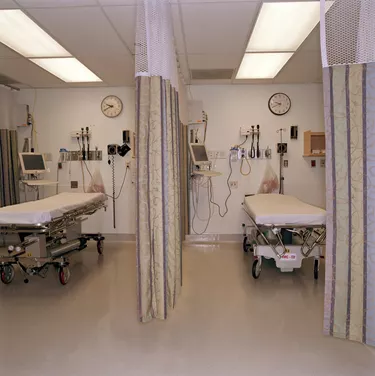
According to the Kaiser Family Foundation, more than 41 million people were uninsured as of 2013. Although some receive insurance through an employer, many unemployed and low income people do not have access to group coverage. Further, private health insurance premiums can be expensive, making individual coverage unaffordable for most. Whatever the reason, not having health insurance can have costly and sometimes deadly consequences.
Financial Burden and Increased Debt
Video of the Day
The rIsk of catastrophic healthcare expenses is a major consequence of not having insurance. The uninsured often pay more for medical coverage, leading to a strain in household finances and mounting debt due to unpaid bills. According to a study by Nerd Wallet, medical bills are the number one reason people file for personal bankruptcy. Further, medical debt often causes a drop in credit score due to collections and high credit card balances used to pay hospital bills.
Video of the Day
Delayed Care
People without health insurance often avoid going to the doctor, usually because of the cost of care. Uninsured individuals are less likely to advantage of preventative care such as annual physicals and check ups. These routine exams help doctors catch potential problems early. Without them, the uninsured run the risk of acquiring a serious illness that a simple blood test may have helped prevent.
Further, people without health insurance often try and self-diagnose, or ignore symptoms until they become unbearable. As a result, the uninsured delay seeking care until the last possible moment or until a minor issue becomes an emergency. This delay can have major health consequences. A report by FamiliesUSA indicates that 26,100 people died prematurely in 2010 as a result of not having health coverage.
Less Access to Quality Care
Healthcare providers are not required to offer care to uninsured individuals. By law, only emergency rooms must provide immediate medical attention to the uninsured. Once an individual is stabilized, follow-up care is limited unless the person can pay for the visit in full.
Tax Penalties
The Affordable Care Act, also known as Obamacare, was designed to reduce the number of uninsured in the United States. The primary goal of the act is to provide more Americans with access to affordable healthcare coverage. The act also stipulates that everyone must be enrolled in a healthcare plan or pay a penalty. If you're uninsured, you'll face tax consequences unless you're exempt from the penalty because of the following: You do not need to file a tax return Your income is less than 138 percent of the Federal Poverty Level You are an illegal immigrant, Indian Tribal Member or incarcerated Your religion provides its own healthcare or *You do not reside within the country
The penalty for not having health insurance is one percent of your income or $95, whichever is less.